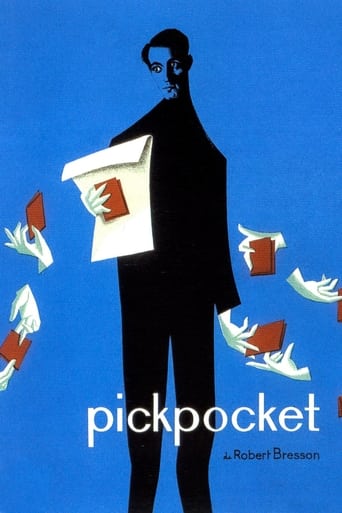

Some reviewers say that "this film is not for regular film-goers but for people with a better appreciation for art", but there is only one criterion for a true work of art; an original expression appealing to the heart. Criterion, in its introduction to one of his films says: "...Robert Bresson began to implement his stylistic philosophy as a filmmaker, stripping away all inessential elements from his compositions, the dialog and the music, exacting a purity of image and sound.". He also refrained from using professional actors. We'd better watch documentaries. This film, with its "wooden" acting, lifeless dialogs, monotonous tempo, unnecessary narrating voice, stolen but frozen version of "supermensch" argument of Nietzsche (religiously criticized in Dostoevsky's Crime and Punishment with PASSION -lacking 100% in this film) leaves nothing to enjoy. All to one side; an "art" film avoiding everything popular tries to display the "subtleties of pickpocketing", orchestration of gang members in operation (without success due to non-fluid editing done) "a la Hollywood"in order to add some life to this otherwise worthless drama. I have watched a few films by Bresson: "Les dames de.." lacks emotion. "Diary of a Country Priest" is advisable only to priests. "A ManEscaped" is much better since it does not preach and has a nice change of tempo at the end.
... View Moreat the beginning of Pickpocket, before the opening credits, Bresson needed to stress that this is not crime thriller. he explained that he seeks, through image and sound, to express the nightmare of a young man led by weakness to adventure in stealing, for which he was not destined to.. this is a story of sin and redemptionbeing interested in Bresson's cinema and after watching some of his films, i've come to know just how much he dislikes expressive acting. Bresson insists to show no emotion or modulation from his actors; displaying almost exclusively blank stares and largely stagnant apparels and levelled speaking volume - his ascetic nature. but i think that in the process, he constantly invites the viewer into the film because in those faces, we see and observe what we are bringing to them; and the involvement goes quite deep once the viewer realizes his role.we do not know the reasons which led the protagonist (Michel) to steal and we never see him use the fruit of his thefts. Bresson is showing the effects, not the causes, which leaves us out of the loop, but it's intentional to make us feel before understanding. we decide that it's a compulsion for Michel to steal, as he is ecstatic when he surrenders to it, he is dominating.throughout the film, the exercise of pickpocketing becomes more compulsive, and the directorial treatment grows more meticulous, resulting in a fascinating sequence showing the gang of pickpockets operating successively in a railway station and on a train. during the precise quick series of stealing, the camera perfectly mirrors them by quickly changing angles, distances and directions; complemented by skillful editing.i'm presently having a major Radiohead kick, and i couldn't help but to somehow make a connection here. the film, like the band often do, presents a splendid portrait of alienation and revolt. the camera seems to patiently follow Michel or wait for his arrival; he is estranged from his surroundings. the camera generally takes a face to face position which creates a sense of separation between him and those around. there's also a feeling of leaving adolescence and entering adulthood; the act of theft can be seen as an act of revolt, a rejection of society. yet we feel a strong to desire to exist and find a place in this world.Michel is a proud rebellious man. in a conversation with the inspector, he outlined his theory of superior beings, who would be above the law (very reminding of Brandon from Hitchcock's Rope). but later in the film, Michel deliberately tries to pickpocket a police decoy even if he is suspicious of him. and when he's caught, he shows no reaction; almost as if he's asking for it. maybe that's his way of redemption (to trick himself into letting his guard down to finally submit to the common man laws); or maybe he just couldn't help but give in to his compulsion.. either way, the film shows no motives"however this adventure and the strange path it takes, brings together two souls that may otherwise never have met". there's graceful sense of predestination here; in the film's powerful conclusion, Michel finds his redemption. the revelation of his love to Jeanne enlightens and finally saves him. Pickpocket is a compassionate exploration of human frailty and a masterpiece of narrative economy.
... View MoreIn Paris, the lonely and anguished pickpocket Michel (Martin La Salle) lives in a dirty little room and spends his time stealing wallets and purses in public spaces. His only friends are Jacques (Pierre Leymarie), who tries to help him to find a job, and his mother's next door neighbor Jeanne (Marika Green). After the death of his mother, Michel teams-up with two smalltime thieves despite the permanent surveillance of the local police inspector (Jean Pélégri). Later he travels overseas to get rid of the observation of the police, but two years later he returns to Paris and finds Jeanne alone, with her son with Jacques after a brief love affair. Michel decides to help her and find an honest job; but in a horse race, he is tempted by his addiction with tragic consequences.This is the first time that I have watched"Pickpocket" and I expected much more from this famous movie. The development of the lead character Michel is confused and it is clear that he is a troubled, lonely and anguished unemployed young man, but it is never clear the motives why he is addicted in stealing since he shows no ambition or dream or love. The beauty of Marika Green is impressive and she seems to love Michel since the very beginning but again her feelings are never clear. Indeed the actors and actress express no sentiments and the plot is very weird. My vote is seven.Title (Brazil): "Pickpocket"
... View MoreIn his dismissal determination to keep out elements often thought fundamental to the mediumspectacle, drama, performance Bresson has followed an incomparable personal vision of the world that stays consistent whatever the nature of his subject matter...In "Pickpocket," a petty thief understands life's mystery only when his conventional wisdom is violently shaken and embraces humanity through his newfound love Most notable, however, is not the emphasis upon redemption attained through communication and self-sacrifice, but the high-purity of Bresson's style...The camera keeps out pictorial beauty to create an abstract timeless world through the detached, detailed observation of hands, faces, and objects; natural sounds rather than music to satisfy the need In thus rejecting conventional realism and characterization, Bresson manifested a fascination not with human psychology but with the capacity of the soul to survive in a world of pain, disbelieve, and restriction...
... View More